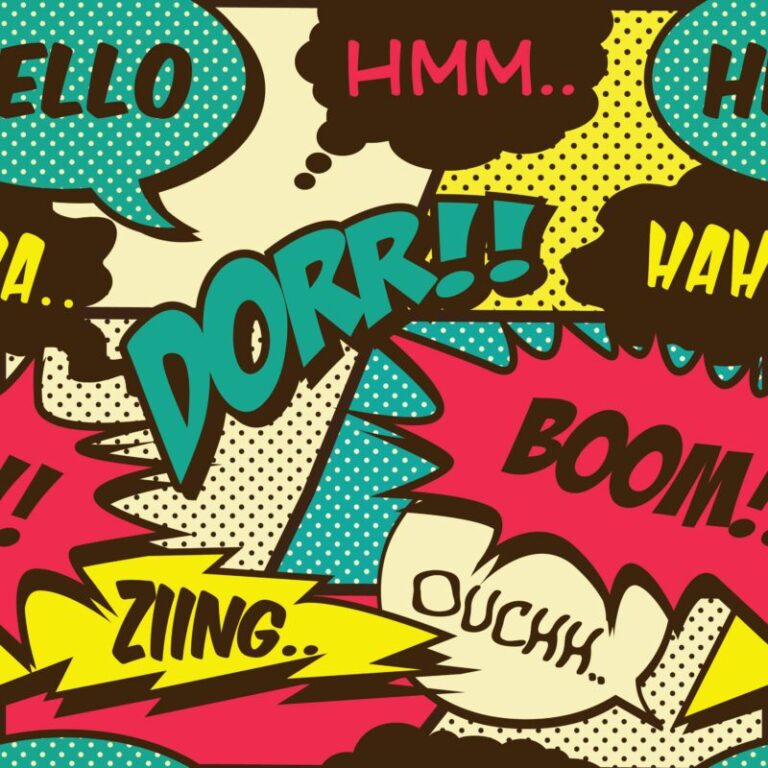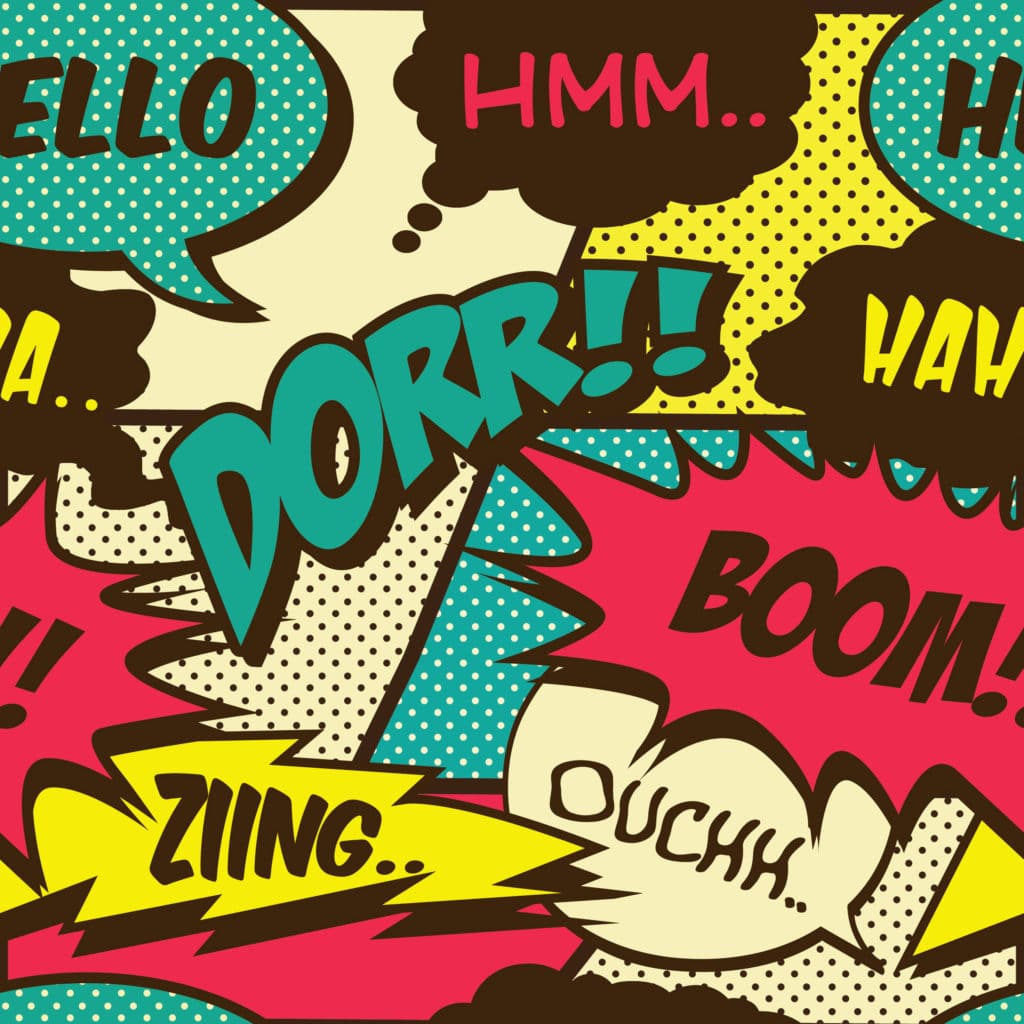
Onomatopoeia—or, onomatopeya in Spanish—are words associated with sounds.
Take animal noises as an example. The word “buzz” represents the noise a bee makes.
Learning onomatopoeia in Spanish might not seem important at first.
But knowing these fun little words will help you better understand Spanish media—like TV shows, movies, songs and comic books—and spice up your study routine.
In this post, we’ll learn over 60 common onomatopoeia in Spanish.
Contents
Download:
This blog post is available as a convenient and portable PDF that you
can take anywhere.
Click here to get a copy. (Download)
Spanish Onomatopoeia for Animal Sounds
| Spanish | Meaning |
|---|---|
| Mu |
Moo (sound of a cow) |
| Guau |
Woof (sound of a dog) |
| Miau |
Meow (sound of a cat) |
| Cuack |
Quack (sound of a duck) |
| Bee |
Baa (sound of a sheep) |
| Jiiii |
Neigh (sound of a horse) |
| Croac |
Ribbit (sound of a frog) |
| Oink |
Oink (sound of a pig) |
| Zumbido |
Buzz (sound of a bee) |
| Croac |
Caw (sound of a crow) |
| Siseo |
Hiss (sound of a snake) |
| Gr |
Gur (sound of growling) |
Spanish Onomatopoeia for People
| Spanish | Meaning | Example |
|---|---|---|
| Plas or alas |
The sound of applause or hand clapping | La audiencia aplaudió al final del musical. ¡Plas, plas, plas!
(The audience applauded at the end of the musical. Clap, clap, clap!) |
| Zzzz |
The sound of a person sleeping | El perro hace “zzzzz” porque está durmiendo.
(The dog goes “zzzz” because he is sleeping.) |
| Rrrr |
The sound of a person snoring | Mi padre ronca como un oso, ¡rrrr!
(My father snores like a bear, huugh!) |
| Toc toc or tras tras |
The sound of knocking on a door | Toc, toc, toc. Mi vecino golpeaba en la puerta.
(Knock, knock, knock. My neighbor knocked on the door.) |
| Ñam, ñam, ñam |
The sound of eating | Cuando ella come la comida italiana, dice: “Ñam, ñam, ñam.”
(When she eats Italian food, she says, “Num, num, num.”) |
| Oaaa, oaaa |
The sound of waking up | “Oaaa, oaaa,” ella bostezó por la mañana.
(“Aaah,” she yawned in the morning.) |
| Hip, hip |
The sound of hiccuping | “Hip, hip, hip,” el elefante hace cuando bebe el jugo.
(“Hiccup, hiccup, hiccup,” the elephant goes when it drinks the juice.) |
| Cataplum , catapum , cataplún or cataplam |
The general sound of hitting, bumping or colliding with an object | ¡Cataplún! El coche chocó con el camión.
(Crash! The car collided with the truck.) |
| Ejem, ejem |
The sound of coughing | “Ejem, ejem” el profesor carraspeó.
(“Cough, cough,” the teacher cleared his throat.) |
| Mua , muac , muak or chuic |
The sound of kissing | ¡Guácala! El sonido de besos, muak muak, es repugnante.
(Yuck! The sound of kissing, mua mua, is gross.) |
| Jajaja or jejeje |
The sound of laughter | ¡Jajaja! ¡Eres muy chistoso!
(Ha ha ha! You’re very funny!) |
| Achí |
Achoo (the sound of a sneeze) | ¡Achí! ¡Me resfrié y no puedo parar de estornudar!
(Achoo! I got a cold and I can’t stop sneezing!) |
| Glup |
Gulp | ¡Glup! Me comí un trozo de pastel demasiado grande de un solo bocado.
(Gulp! I ate too big a piece of cake in one bite.) |
| Uf |
The sound you make when something smells awful | ¡Uf! ¡El queso limburger huele horrible!
(Yuck! Limburger cheese smells horrible!) |
Spanish Onomatopoeia for Sound Effects
| Spanish | Meaning | Example |
|---|---|---|
| Chof or plas |
The sound of jumping into water | ¡La chica salta en la piscina con un chof!
(The girl jumps into the pool with a splash!) |
| Paf |
The sound two items make when they hit each other or an item falls over | ¡El libro golpea el estante, paf!
(The book hits the shelf, paf!) |
| Pataplum or cataplum |
The sound of an explosion | ¡Pataplum! Los fuegos artificiales explotaron.
(Boom! The fireworks exploded.) |
| Zas |
The sound of anything being struck, such as smacking someone’s face or cracking a whip | ¡Zas! El domador de leones restalló el látigo contra la pared.
(Crack! The lion tamer cracked his whip against the wall.) |
| Tan, tan, tan |
The sound a bell makes, striking an anvil, hitting a hammer, etc. | ¡Escuche! El herrero bate su yunque con el martillo. ¡Tan, tan, tan!
(Listen! The blacksmith hits his anvil with the hammer. Clang, clang, clang!) |
| Uuuuh, uuuuh |
The sound of a police car, firetruck or ambulance | ¿Puedes oír las sirenas del coche de bomberos? ¡Uuuuh uuuuh! ¡Uuuuh uuuuh!
(Can you hear the firetruck’s sirens? Wee woo! Wee woo!) |
| Plic, plic |
The sound of soft rain | Plic, plic. La lluvia pega sobre el techo.
(Plop. Plop. The rain hits the roof.) |
| Crag |
The sound of objects breaking | ¡Crag! El jarrón Ming rompió en el museo.
(Crack! The Ming vase broke in the museum.) |
| Ñeec, ñeec |
The sound of mattress springs | Los monos saltan en la cama, ñeec, ñeec.
(The monkeys jump on the bed, squeak, squeak.) |
| Bang or pam pam |
The sound a gun makes | ¡Cuidado! ¡El ladrón tiene una pistola! ¡Pam, pam, pam!
(Careful! The thief has a gun! Bang, bang, bang!) |
| Tintín or chin-chin |
The sound of clinking glass | Los vasos se chocan “chin-chin” cuando lavo los platos.
(The glasses clink each other when I wash the dishes.) |
| Glu, glu, glu |
The sound of bubbles | Las burbujas fueron glu, glu cuando reventaron.
(The bubbles went pop, pop when they burst.) |
| Ra-ta-tá, ra-ta-tá |
The sound of a machine gun | ¡Ra-ta-tá! ¡Ra-ta-tá! La ametralladora nunca paró de disparar.
(Ratatat! Ratatat! The machine gun never stopped firing.) |
| Tric or tris |
The sound of a small explosion | Ellos hacen un explosión pequeño en la clase de ciencias. ¡Tric!
(They make a small explosion in science class. Boom!) |
| Chischás |
The sound of sword fighting | Los mosqueteros luchan con espadas. ¡Chischás!
(The musketeers fight with swords. Clang!) |
| Rin, rin |
The sound of a bell | ¡Rin, rin! El sonido de la campana es como música.
(Ding, ding! The bell’s sound is like music.) |
Onomatopoeia Verbs in Spanish
| Spanish | English | Meaning |
|---|---|---|
| Chispear |
To sizzle or crackle | Onomatopoeia for the sound of sparks |
| Chirriar |
To squeak or screech | Onomatopoeia for a high-pitched sound |
| Zumbir |
To buzz | Onomatopoeia for the sound of a bee or a buzzing noise |
| Chapotear |
To splash | Onomatopoeia for the sound of water splashing |
| Gorjear |
To chirp | Onomatopoeia for the sound of birds chirping |
| Retumbar |
To rumble | Onomatopoeia for a deep, resonating sound |
| Tronar |
To thunder or crack | Onomatopoeia for the sound of thunder |
| Silbar |
To whistle | Onomatopoeia for the sound of a whistle |
| Tictaquear |
To tick-tock | Onomatopoeia for the sound of a clock ticking |
| Crujir |
To creak or crunch | Onomatopoeia for a cracking or crunching sound |
| Cuchichear |
To whisper or murmur | Onomatopoeia for a soft, hushed conversation |
| Chasquear |
To snap or click | Onomatopoeia for a sharp, quick sound |
| Gruñir |
To growl or grumble | Onomatopoeia for a low, threatening sound |
| Chocar |
To collide or crash | Onomatopoeia for the sound of impact |
| Soplar |
To blow | Onomatopoeia for the sound of blowing air |
| Rugir |
To roar | Onomatopoeia for the sound of a loud, deep roar |
| Toser |
To cough | Onomatopoeia for the sound of coughing |
| Resoplar |
To snort | Onomatopoeia for a short, loud exhale of breath |
| Ladrar |
To bark | Onomatopoeia for the sound of a dog barking |
| Gemir |
To moan or groan | Onomatopoeia for a low, guttural sound |
| Estallar |
To explode or burst | Onomatopoeia for a sudden, sharp sound |
Where to Find Onomatopoeia in Spanish
- Children’s books. Think back to the books you used to read as a kid and you’ll instantly remember tons of onomatopoeia in your native language. Find some in Spanish and you’ll learn just as many!
- Songs. Many Spanish songs use onomatopoeia. If you listen to enough, you’re bound to come across several commonly used ones.
- Comic books are filled with onomatopoeia. Try these classics to get started:
“Chistes para siempre: Cuentos graciosos y humor gráfico para reír sin parar” (“Jokes Forever: Funny Stories and Graphic Humor to Laugh Without Stopping”)
“10 años con Mafalda” (“10 Years with Mafalda”)
“Yakuza Girl” volume one (Spanish Edition)
Knowing onomatopoeia in Spanish will help you better understand native content and add some excitement to your studies.
From children’s books to Spanish sitcoms, you’ll find tons of these fun little words and many more.
Download:
This blog post is available as a convenient and portable PDF that you
can take anywhere.
Click here to get a copy. (Download)
And One More Thing…
If you’ve made it this far that means you probably enjoy learning Spanish with engaging material and will then love FluentU.
Other sites use scripted content. FluentU uses a natural approach that helps you ease into the Spanish language and culture over time. You’ll learn Spanish as it’s actually spoken by real people.
FluentU has a wide variety of videos, as you can see here:
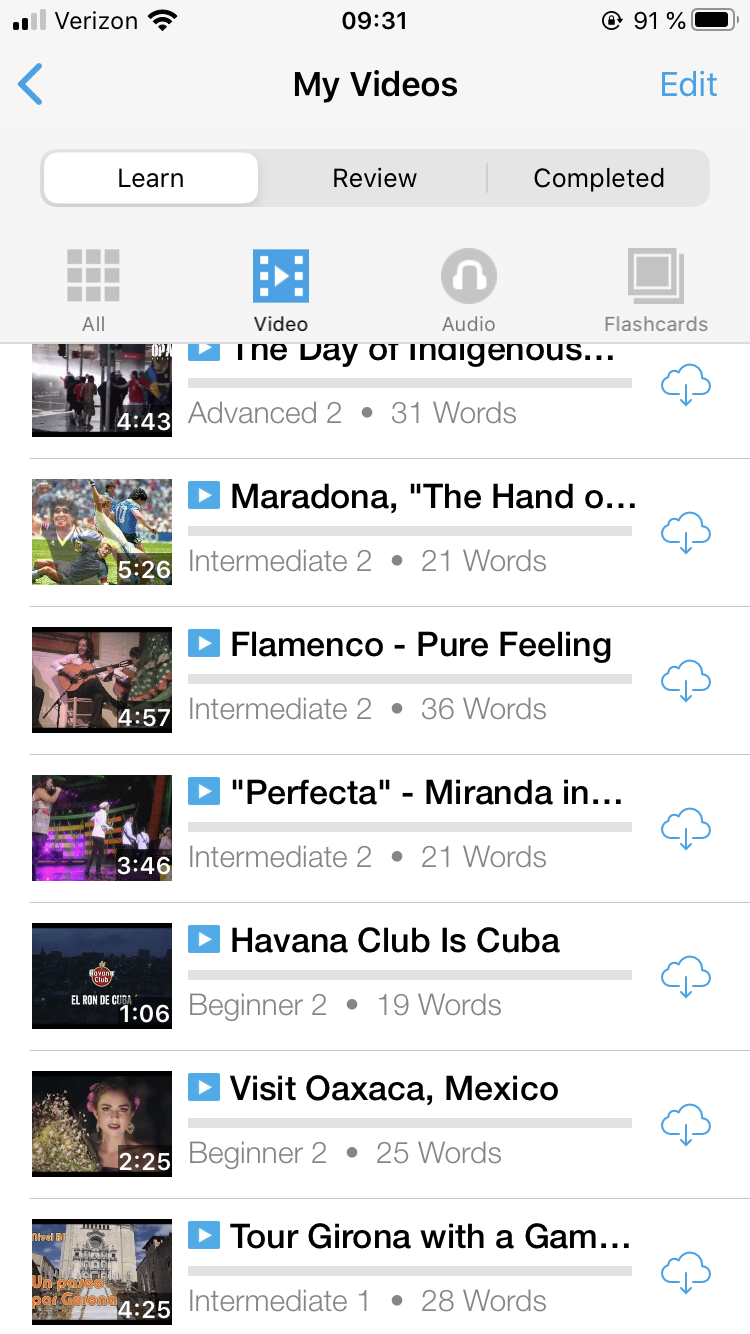
FluentU brings native videos within reach with interactive transcripts. You can tap on any word to look it up instantly. Every definition has examples that have been written to help you understand how the word is used. If you see an interesting word you don’t know, you can add it to a vocab list.
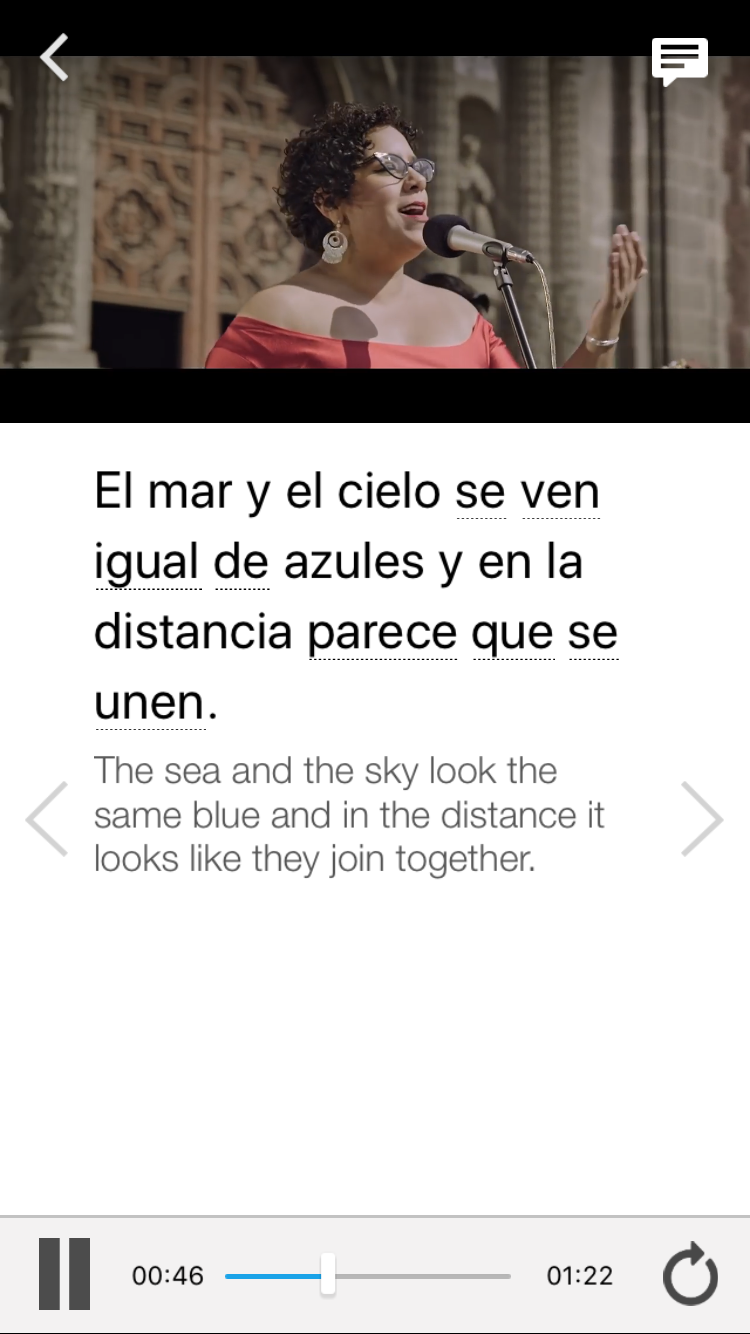
Review a complete interactive transcript under the Dialogue tab, and find words and phrases listed under Vocab.
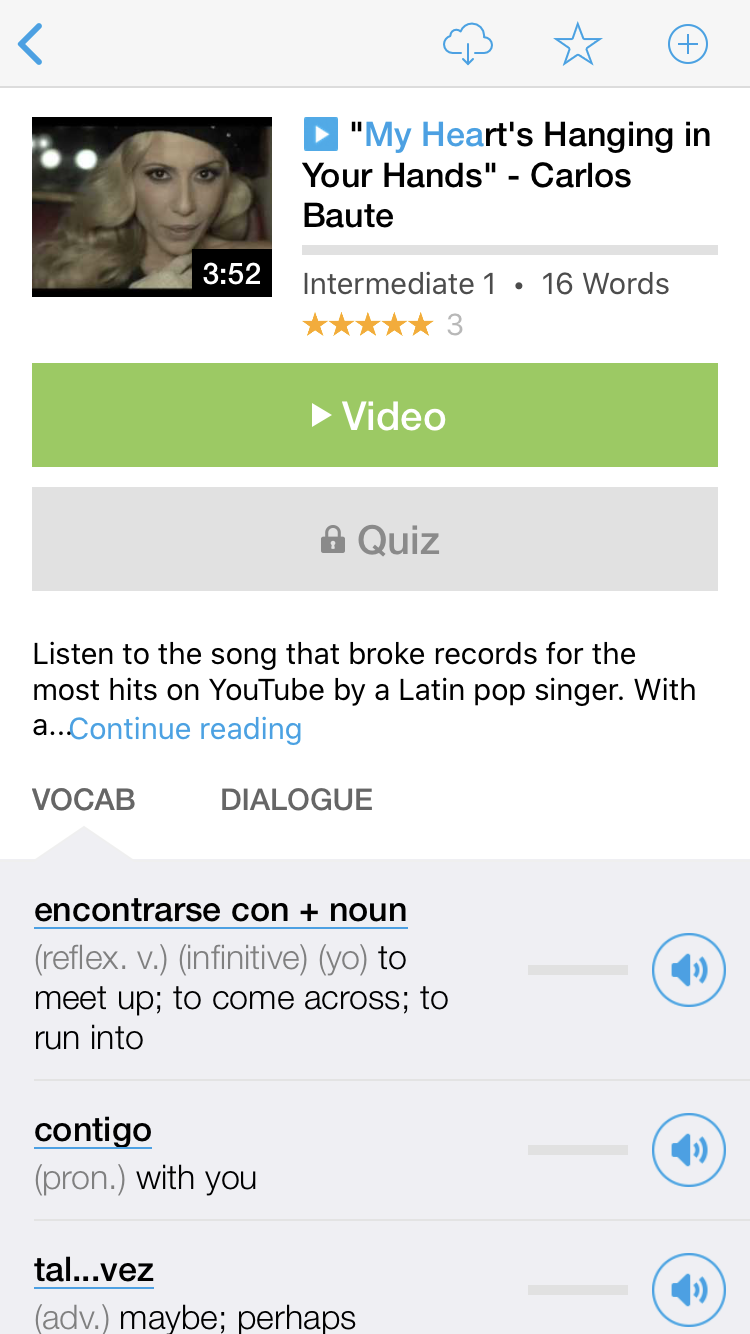
Learn all the vocabulary in any video with FluentU’s robust learning engine. Swipe left or right to see more examples of the word you’re on.
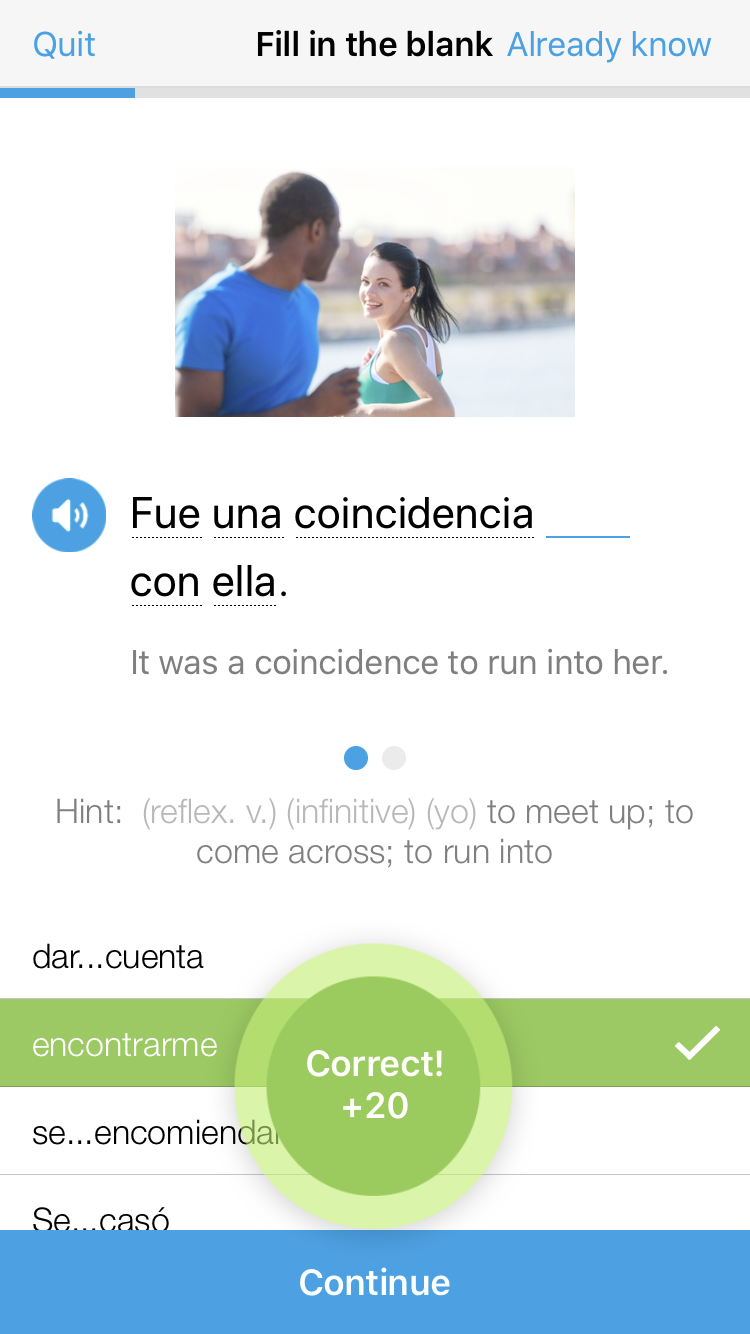
The best part is that FluentU keeps track of the vocabulary that you’re learning, and gives you extra practice with difficult words. It’ll even remind you when it’s time to review what you’ve learned. Every learner has a truly personalized experience, even if they’re learning with the same video.
Start using FluentU on the website with your computer or tablet or, better yet, download the FluentU app.


